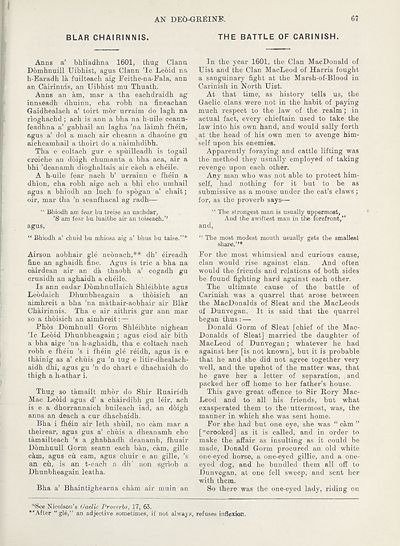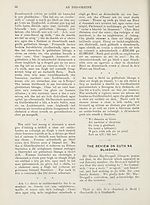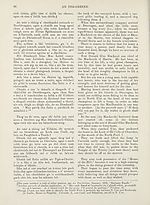An Comunn Gàidhealach Publications > Deo-gréine > Volume 16, October 1920-September 1921
(75) Page 67
Download files
Complete book:
Individual page:
Thumbnail gallery: Grid view | List view

AN DEO-GREINR
67
BLAR CHAIRINNIS. THE BATTLE OF CARINISH.
Anns a’ bhliadhna 1601, thug Clann
Domhnuill Uibhist, agus Clann ’Ic Leoid na
h-Earadh la fuilteach aig Eeithe-na-Eala, ann
an Cairinnis, an Uibhist mu Thuath.
Anns an am, mar a tha eachdraidh ag
innseadh dhuinn, cha robh na fineachan
Gaidhealach a’ toirt mor urraim do lagh na
rioghachd; ach is ann a bha na h-uile ceann-
feadhna a’ gabhail an lagha ’na laimh fhein,
agus a’ dol a mach air cheann a dhaoin© gu
aicheamhail a thoirt do a naimhdibh.
Tha e coltach gur e spuilleadh is togail
creiche an doigh chumanta a bha aca, air a
bhi ’deanamh dioghaltais air each a cheile.
A h-uil© fear nach b’ urrainn e fhein a
dhion, cha robh aige ach a bhi cho umhail
agus a bhiodh an luch fo spogan a’ chait;
oir, mar tha ’n seanfhacal ag radh—
“ Bhiodh am fear bu treise an uachdar,
’S am fear bu luaithe air an toiseaoh.’’
agus,
“ Bhiodh a’ chuid bu mhiosa aig a’ bhus bu taise.”*
Airson aobhair gle neonach,** dh’ eireadh
fine an aghaidh fine. Agus is trie a bha na
cairdean air an da thaobh a’ cogadh gu
cruaidh an aghaidh a cheile.
Is ann eadar Domhnullaich Shleibhte agus
Leodaich Dhunbheagain a thoisich an
aimhreit a bha ’na mathair-aobhair air Blar
Chairinnis. Tha e air aithris gur ann mar
so a thoisich an aimhreit: —
Phos Domhnull Gorm Shleibhte nighean
’Ic Leoid Dhunbheagain; agus ciod air bith
a bha aige ’na h-aghaidh, tha e coltach nach
robh e fhein ’s i fhein gle reidh, agus is e
thainig as a’ chuis gu ’n tug © litir-dhealach-
aidh dhi, agus gu ’n do chart e dhachaidh do
thigh a h-athar i.
Thug so tamailt mhor do Shir Ruairidh
Mac Leoid agus d’ a chairdibh gu leir, ach
is e a dhorrannaich buileach iad, an doigh
anns an deach a cur dhachaidh.
Bha i fhein air leth shuil, no cam mar a
theirear, agus gus a’ chuis a dheanamh cho
tamailteach ’s a ghabhadh deanamh, fhuair
Domhnull Gorm seann each ban, cam, gille
cam, agus cu cam, agus chuir e an gille, ’s
an cii, is an t-each a dh’ aon sgrlob a
Dhunbheagain leatha.
Bha a’ Bhaintighearna cham air muin an
In the year 1601, the Clan MacDonald of
Uist and the Clan MacLeod of Harris fought
a sanguinary fight at the Marsh-of-Blood in
Carinish in North Uist.
At that time, as history tells us, the
Gaelic clans were not in the habit of paying
much respect to the law of the realm; in
actual fact, every chieftain used to take the
law into his own hand, and would sally forth
at the head of his own men to avenge him¬
self upon his enemies.
Apparently foraying and cattle lifting was
the method they usually employed of taking
revenge upon each other.
Any man who was not able to protect him¬
self, had nothing for it but to be as
submissive as a mouse under the cat’s claws ;
for, as the proverb says—
“ The strongest man is usually uppermost,
And the swiftest man in thte forefront,”
and,
“ The most modest mouth usually gets the smallest
share.’’*
For the most whimsical and curious cause,
clan would rise against clan. And often
would the friends and relations of both sides
be found fighting hard against each other.
The ultimate cause of the battle of
Carinish was a quarrel that arose between
the MacDonalds of Sleat and the MacLeods
of Dunvegan. It is said that the quarrel
began thus: —
Donald Gorm of Sleat [chief of the Mac¬
Donalds of Sleat] married the daughter of
MacLeod of Dunvegan; whatever he had
against her [is not known], but it is probable
that he and she did not agree together very
well, and the upshot of the matter was, that
he gave her a letter of separation, . and
packed her off home to her father’s house.
This gave great offence to Sir Rory Mac¬
Leod and to all his friends, but what
exasperated them to the uttermost, was, the
manner in which she was sent home.
For she had but one eye, she was “ cam ”
[=crooked] as it is called, and in order to
make the affair as insulting as it could be
made, Donald Gorm procured an old white
one-eyed horse, a one-eyed gillie, and a one-
eyed dog, and he bundled them all off to
Dunvegan, at one fell sweep, and sent her
with them.
So there was the one-eyed lady, riding on
"'See Nicolson’s Gaelic, Proverbs, 17, 63.
**After “ gle,” an adjective sometimes, if not always, refuses inflexion.
67
BLAR CHAIRINNIS. THE BATTLE OF CARINISH.
Anns a’ bhliadhna 1601, thug Clann
Domhnuill Uibhist, agus Clann ’Ic Leoid na
h-Earadh la fuilteach aig Eeithe-na-Eala, ann
an Cairinnis, an Uibhist mu Thuath.
Anns an am, mar a tha eachdraidh ag
innseadh dhuinn, cha robh na fineachan
Gaidhealach a’ toirt mor urraim do lagh na
rioghachd; ach is ann a bha na h-uile ceann-
feadhna a’ gabhail an lagha ’na laimh fhein,
agus a’ dol a mach air cheann a dhaoin© gu
aicheamhail a thoirt do a naimhdibh.
Tha e coltach gur e spuilleadh is togail
creiche an doigh chumanta a bha aca, air a
bhi ’deanamh dioghaltais air each a cheile.
A h-uil© fear nach b’ urrainn e fhein a
dhion, cha robh aige ach a bhi cho umhail
agus a bhiodh an luch fo spogan a’ chait;
oir, mar tha ’n seanfhacal ag radh—
“ Bhiodh am fear bu treise an uachdar,
’S am fear bu luaithe air an toiseaoh.’’
agus,
“ Bhiodh a’ chuid bu mhiosa aig a’ bhus bu taise.”*
Airson aobhair gle neonach,** dh’ eireadh
fine an aghaidh fine. Agus is trie a bha na
cairdean air an da thaobh a’ cogadh gu
cruaidh an aghaidh a cheile.
Is ann eadar Domhnullaich Shleibhte agus
Leodaich Dhunbheagain a thoisich an
aimhreit a bha ’na mathair-aobhair air Blar
Chairinnis. Tha e air aithris gur ann mar
so a thoisich an aimhreit: —
Phos Domhnull Gorm Shleibhte nighean
’Ic Leoid Dhunbheagain; agus ciod air bith
a bha aige ’na h-aghaidh, tha e coltach nach
robh e fhein ’s i fhein gle reidh, agus is e
thainig as a’ chuis gu ’n tug © litir-dhealach-
aidh dhi, agus gu ’n do chart e dhachaidh do
thigh a h-athar i.
Thug so tamailt mhor do Shir Ruairidh
Mac Leoid agus d’ a chairdibh gu leir, ach
is e a dhorrannaich buileach iad, an doigh
anns an deach a cur dhachaidh.
Bha i fhein air leth shuil, no cam mar a
theirear, agus gus a’ chuis a dheanamh cho
tamailteach ’s a ghabhadh deanamh, fhuair
Domhnull Gorm seann each ban, cam, gille
cam, agus cu cam, agus chuir e an gille, ’s
an cii, is an t-each a dh’ aon sgrlob a
Dhunbheagain leatha.
Bha a’ Bhaintighearna cham air muin an
In the year 1601, the Clan MacDonald of
Uist and the Clan MacLeod of Harris fought
a sanguinary fight at the Marsh-of-Blood in
Carinish in North Uist.
At that time, as history tells us, the
Gaelic clans were not in the habit of paying
much respect to the law of the realm; in
actual fact, every chieftain used to take the
law into his own hand, and would sally forth
at the head of his own men to avenge him¬
self upon his enemies.
Apparently foraying and cattle lifting was
the method they usually employed of taking
revenge upon each other.
Any man who was not able to protect him¬
self, had nothing for it but to be as
submissive as a mouse under the cat’s claws ;
for, as the proverb says—
“ The strongest man is usually uppermost,
And the swiftest man in thte forefront,”
and,
“ The most modest mouth usually gets the smallest
share.’’*
For the most whimsical and curious cause,
clan would rise against clan. And often
would the friends and relations of both sides
be found fighting hard against each other.
The ultimate cause of the battle of
Carinish was a quarrel that arose between
the MacDonalds of Sleat and the MacLeods
of Dunvegan. It is said that the quarrel
began thus: —
Donald Gorm of Sleat [chief of the Mac¬
Donalds of Sleat] married the daughter of
MacLeod of Dunvegan; whatever he had
against her [is not known], but it is probable
that he and she did not agree together very
well, and the upshot of the matter was, that
he gave her a letter of separation, . and
packed her off home to her father’s house.
This gave great offence to Sir Rory Mac¬
Leod and to all his friends, but what
exasperated them to the uttermost, was, the
manner in which she was sent home.
For she had but one eye, she was “ cam ”
[=crooked] as it is called, and in order to
make the affair as insulting as it could be
made, Donald Gorm procured an old white
one-eyed horse, a one-eyed gillie, and a one-
eyed dog, and he bundled them all off to
Dunvegan, at one fell sweep, and sent her
with them.
So there was the one-eyed lady, riding on
"'See Nicolson’s Gaelic, Proverbs, 17, 63.
**After “ gle,” an adjective sometimes, if not always, refuses inflexion.
Set display mode to:
![]() Universal Viewer |
Universal Viewer | ![]() Mirador |
Large image | Transcription
Mirador |
Large image | Transcription
| An Comunn Gàidhealach > An Comunn Gàidhealach Publications > Deo-gréine > Volume 16, October 1920-September 1921 > (75) Page 67 |
|---|
| Permanent URL | https://digital.nls.uk/125654887 |
|---|
| Description | Leabhar 16, Mìos Deireannach an Fhogharaidh 1920 gu Darna Mìos an Fhoghair 1921 |
|---|---|
| Attribution and copyright: |
|
| Description | This contains items published by An Comunn, which are not specifically Mòd-related. It includes journals, annual reports and corporate documents, policy statements, educational resources and published plays and literature. It is arranged alphabetically by title. |
|---|
| Description | A collection of over 400 items published by An Comunn Gàidhealach, the organisation which promotes Gaelic language and culture and organises the Royal National Mòd. Dating from 1891 up to the present day, the collection includes journals and newspapers, annual reports, educational materials, national Mòd programmes, published Mòd literature and music. |
|---|---|
| Additional NLS resources: |
|

